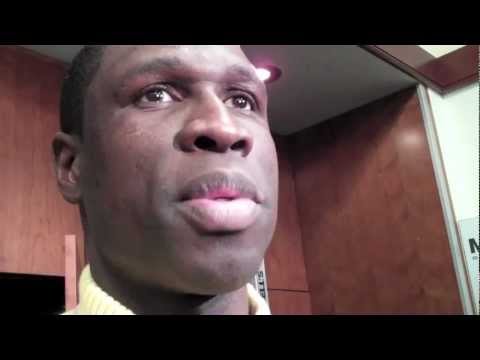Utah’s Rudy Gobert was the most valuable sixth man on a lottery team this season.
Every team searches for players that can come off the bench and contribute without a drop off in production. Even lottery teams.
As The Lottery Mafia award circuit continues, it’s important to recognize the top options on the bottom-dwelling teams that, for the most part, entered the game off the pine.
In the regular NBA Sixth-Man of the Year award voting, a player must come off the bench in more games than he starts. Media members choose their top-three choices, ranked, with point values assigned to each spot (5, 3, and 1).
Here is the results of this year’s Lottery Mafia Sixth Man of the Year voting by the panel (of one):
First Place – Rudy Gobert
Gobert has had a terrific start to the Lottery Mafia awards season, as he was named the Most Improved player earlier this week. Gobert started 37 of 82 games this season, and finished with averages of 8.4 points, 9.5 rebounds and 2.3 blocks per game.
The “Stifle Tower” began the season as the backup to Enes Kanter, who was dealt to Oklahoma City at the trade deadline. The Frenchman was inserted into the starting lineup and immediately upgraded the Utah defense to one of the best in the league.
The WHOLE league.
Gobert’s defensive impact led to a fifth-place finish in the NBA Defensive Player of the Year voting. Utah ranked 26th in defensive rating prior to Gobert’s increase in minutes and opportunity, and finished the season 14th.
It gets better.
After the All-Star break the Jazz posted a defensive rating of 94.8, per NBA.com. The second-best team? Memphis- a whopping 4.6 points worse at 99.4.
Gobert may not be an elite scorer, but he is a legitmate threat to win the NBA Defensive Player of the Year award in 2015-16 and lead the Jazz into the playoffs.
In looking at the candidates, Gobert runs away with the Lottery Mafia Sixth Man of the Year award.
Second Place – Mo Williams
Mo Williams is a valid choice to be in the picture as well. He started 33 of 68 games, and was arguably the best bench scorer amongst lottery teams.
Williams began the season with the Minnesota Timberwolves, averaging 12.2 points and 6.4 assists per game. After he was sent to Charlotte prior to the trade deadline, the former Alabama guard increased his scoring output to 17.2 points per game, while maintaining a 6.0 assists per game rate.
His shooting percentages could have been more efficient, though he was placed in positions where he needed to be a scorer and shooter. Neither Minnesota or Charlotte had a knock down shooter on the roster, leaving Williams as the best option to take over that role.
He finished with a league-average player efficiency rating, which helps Gobert widen the gap between first and second, but it would be a shame not to honor Mo as the runner up.
Fun fact to remember: Williams was the first player to hit 50 points in a game this season.
Third Place – Ed Davis
Finding a third-place choice deserving of mention here was a more difficult task than anticipated.
Davis was by no means a flashy choice, but an efficient choice that made a great impact on both ends of the floor. Davis finished up the season starting 24 of 79 contests, posting averages of 8.3 points, 7.6 rebounds and 1.2 blocks per game in just over 23 minutes. The former Tar Heel also shot over 60 percent from the floor.
The Lakers’ season was fairly doomed from the start, with few offensive options available to carry the team in a stacked Western conference. Davis was a bright spot on a rebuilding team, and likely earned himself a long-term contract and significant raise in the process.
Teams are always looking for a third big man that can back-up both spots, create second chances and score efficiently. Among candidates on lottery teams, no one did it better than Davis.
Add The Sports Daily to your Google News Feed!
